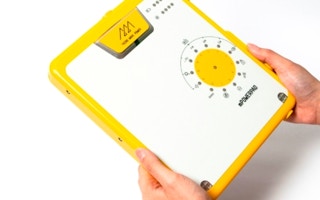Clean technology, or cleantech, companies are launching high-tech gadgets aimed at helping people reduce their personal energy usage, in addition to rolling out larger scale energy solutions.
At the Clean Energy Expo Asia (CEEA) in Singapore last week, now in its third year, new innovations such as a portable solar charger - for people with little access to electricity - made their debut.
Launched at the trade show by home-grown Singapore firm Third Wave Power, mPowerpad is a solar-powered charger that also acts as a light, radio or an ultrasonic insect repellent.
The charger, which weighs just under one kilogram, charges in six hours using sunlight or in one hour through a conventional plug. It has two USB ports for charging personal electronic devices such as mobile phones, tablets or digital cameras.
Third Wave Power co-founder V.S. Hariharan told Eco-Business on the sidelines of the trade show that he and his partners, whose backgrounds include work at Hewlett Packard, Dell and Panasonic, wanted a project with a cleantech angle.
With S$500,000 seed funding from the National Research Foundation (NRF) and advice and financial support from an NRF supported start-up advisory group called Small World Group Incubator, Mr Hariharan and his colleagues developed the mPowerpad to appeal to an estimated 200 million people globally who travel for work or as a hobby to rural areas with limited electricity.
India alone has 50 to 60 million potential users, including professionals in the medical field, who need better access to electricity in the areas where they work, he said.
Mr Hariharan added that the mPowerpad differs from other solar chargers on the market in that it combines multiple functions with extra durability due partly to button and knob-free controls.
The charger - currently in the testing stage - will reach the commercial markets of Southeast Asia, India and Bangladesh early next year. The firm plans to target non-government organisations, such as the Asian Development Bank, with staff in rural communities and retail outlets that cater to outdoor enthusiasts.
Mr Hariharan said the company would later explore marketing the rugged, water-resistant charger – which will retail for about US$80 - in stores that cater to the general public, and also to markets in the United States and Africa.
For those seeking new cleantech gadgets for use closer to home, EVHub – a Singapore-based concept store and research and development (R&D) centre for electric vehicles - showcased the YikeBike.
The YikeBike is a lightweight, foldable electric bicycle that was developed by New Zealand inventor Grant Ryan to facilitate urban commutes.
The developers say the YikeBike – which they dubbed ‘the last mile solution’ - is small enough to carry on a bus or train, and allows more people to access public transport.
An EVHub spokesperson told Eco-Business that the YikeBikes, which have been available in Singapore since July, have sold out faster than the company can import them. EVHub has sold 30 to 40 of the e-bikes, including the units they brought in for the trade show. The YikeBikes are assembled by hand in New Zealand, and only about 400 in total have been produced so far, said the spokesperson.
The YikeBikes, which have a range of 10 kilometres and a top speed of 23 kilometres per hour, come in two versions: a 10.8 kilogram (kg) carbon-fibre version that sells for just under S$5,000 and a slightly heavier (14kg) version made from a combination of aluminium and other materials that sells for just under S$3,000.
Apart from personal gadgets, the trade show also featured a wide array of companies with renewable energy technologies, energy management systems, energy efficient lighting and a variety of clean energy manufacturing technologies.
One that was showcased was the waste-to-energy technology by eco-Wise, a local energy firm that is building a renewable energy plant which will provide electricity and air-conditioning for one of Singapore’s newest landmarks – the conservatories at Gardens by the Bay.
Singapore’s national parks agency, NParks, enlisted eco-Wise to build the one megawatt (MW) facility, which will use dried plant waste from Singapore parks to fuel a co-generation steam plant. Co-generation technology converts fuel to electricity by powering steam turbines, while simultaneously capturing the waste heat to provide either direct heating for buildings or running chillers for air-conditioning systems.
An eco-Wise spokesperson told Eco-Business said that the new plant, which will be operational by the end of this year, will discharge only ash – which would be re-used by NParks as a soil conditioner – and emissions discharged into the air through the park’s new artificial ‘supertrees’. Those emissions will include water vapour, carbon dioxide and a small amount of particulate matter, all of which will be carefully monitored by the National Environment Agency.
Eco-Wise was one of the nearly 170 exhibitors at the trade show, which drew over 5,200 cleantech professionals and experts from 62 countries.
Eco-Business.com’s coverage of Clean Energy Expo Asia 2011, part of Singapore International Energy Week 2011, is brought to you by Schneider Electric.















